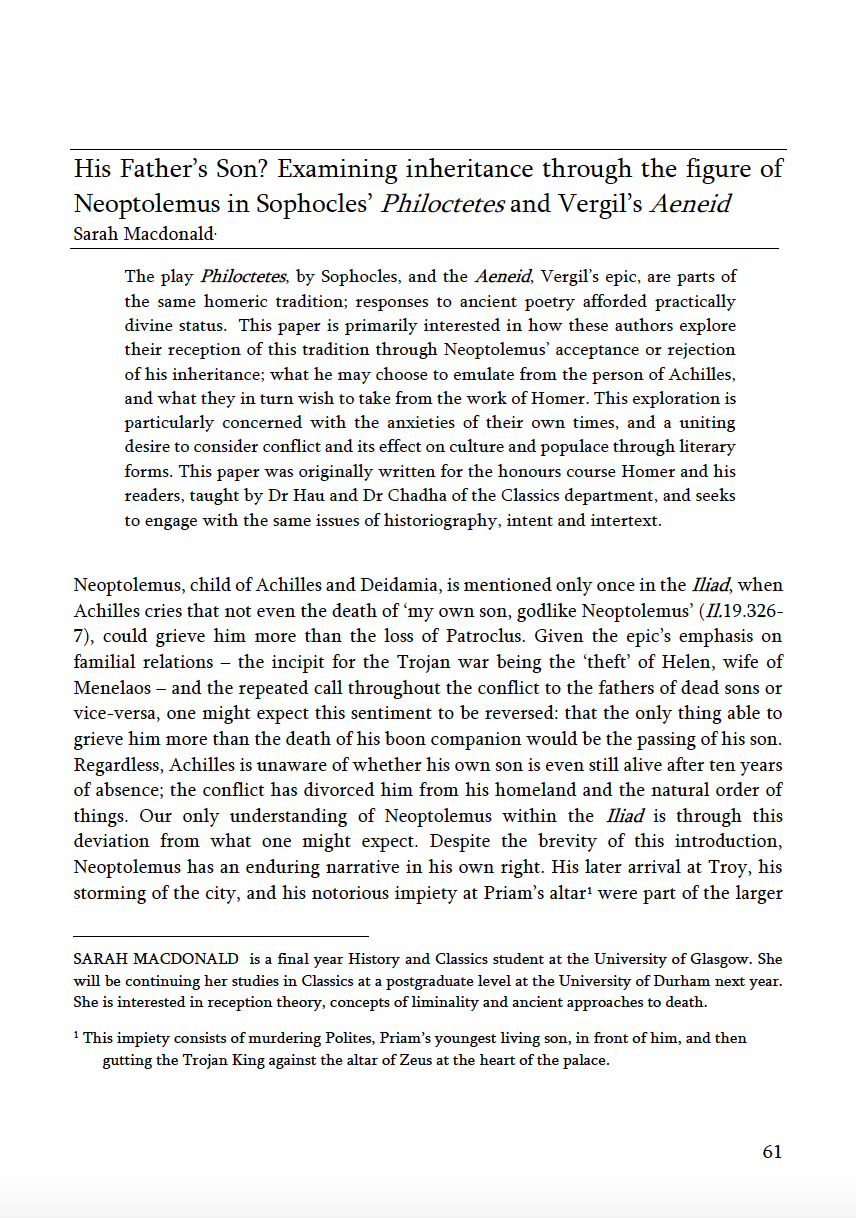His Father’s Son?
Examining inheritance through the figure of Neoptolemus in Sophocles’ Philoctetes and Vergil’s Aeneid
DOI:
https://doi.org/10.36399/GroundingsUG.9.198Keywords:
Aeneid, Philoctetes, Sophocles, Virgil, Inheritance, NeoptolemusAbstract
The play Philoctetes, by Sophocles, and the Aeneid, Vergil’s epic, are parts of the same homeric tradition; responses to ancient poetry afforded practically divine status. This paper is primarily interested in how these authors explore their reception of this tradition through Neoptolemus’ acceptance or rejection of his inheritance; what he may choose to emulate from the person of Achilles, and what they in turn wish to take from the work of Homer. This exploration is particularly concerned with the anxieties of their own times, and a uniting desire to consider conflict and its effect on culture and populace through literary forms. This paper was originally written for the honours course Homer and his readers, taught by Dr Hau and Dr Chadha of the Classics department, and seeks to engage with the same issues of historiography, intent and intertext.
References
Homer, The Iliad, (trans.) Rieu, (New York, 2003).
Vergil, The Aeneid, (trans.) R. Fagles, (New York, 2006).
Sophocles, Electra and Other Plays, (trans.) Raeburn, (New York, 2008).
Strabo, Geography, (trans.) H. L. Jones (Harvard, 1917-1932).
C.R. Beye, Charles Rowan, ‘Sophocles' Philoctetes and the Homeric Embassy’ (1970) 101, Transactions and Proceedings of the American Philological Association, 63–75.
M. W. Blundell, ‘The 'phusis' of Neoptolemus in Sophocles' 'Philoctetes'’, (1988) 35.2 Greece & Rome, 137–148.
S. Budick, ‘The Prospect of Tradition: Elements of Futurity in a Topos of Homer and Virgil’, (1991) 22:1 New Literary History, 23–37.
D. Fowler, ‘Vergil on Killing Virgins’ in Whitby, Whitby, & Hardie (eds.) Homo viator: classical essays for John Bramble, (Bristol, 1987), 185-198.
J. Gottschall, The Rape of Troy: evolution, violence, and the world of Homer (Cambridge, 2008).
B. M. W. Knox, ‘The Serpent and the Flame: The Imagery of the Second Book of the Aeneid’ (1950) 71:4 The American Journal of Philology, 379–400.
B.M.W. Knox, ‘Philoctetes’ (1964) 3:1 Arion: A Journal of Humanities and the Classics, 42–60.
P. Michelakis, Achilles in Greek Tragedy, (Cambridge, 2002).
L. Muellner, The Anger of Achilles: Mȇnis in Greek Epic, (New York, 1996).
A, Rossi, Contexts of War: Manipulation of Genre in Virgilian Battle Narrative, (Ann Arbour, 2004).
M. Whitby, ‘Telemachus Transformed?’ The Origins of Neoptolemus in Sophocles' Philoctetes’ (1996) 43 Greece & Rome, 31-42.
S. L. Schein, ‘The Iliad and Odyssey in Sophocles' Philoctetes: generic complexity and ethical ambiguity’ (2006) 49 Bulletin of the Institute of Classical Studies, Special Issue: Institute of Classical Studies, Bulletin Supplement No. S87:Greek Drama III: Essays in Honour of Kevin Lee,129–140.

Published
Issue
Section
License
Copyright (c) 2016 Sarah Macdonald

This work is licensed under a Creative Commons Attribution 4.0 International License.
The CC BY 4.0 license is a Creative Commons license. This is a non-copyleft free license that is good for art and entertainment works, and educational works. It is compatible with all versions of the GNU GPL; however, like all CC licenses, it should not be used on software. People are free to: Share — copy and redistribute the material in any medium or format; Adapt — remix, transform, and build upon the material for any purpose, even commercially. The licensor cannot revoke these freedoms as long as you follow the license terms. But they must conform to the following terms: Attribution — You must give appropriate credit, provide a link to the license, and indicate if changes were made. You may do so in any reasonable manner, but not in any way that suggests the licensor endorses you or your use. No additional restrictions — You may not apply legal terms or technological measures that legally restrict others from doing anything the license permits.
Please check individual article PDF copies to see if any additional restrictions apply.







